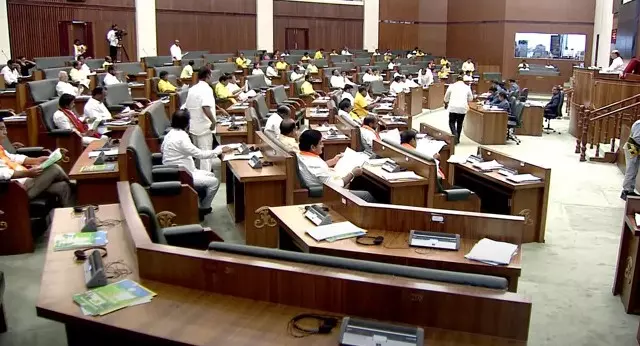By Whitney Curry Wimbish
Copyright prospect

Republican lawmakers at yesterday’s House Committee on Financial Services hearing called for a coordinated national response to the epidemic of fraud sweeping America while simultaneously supporting the evisceration of the Consumer Financial Protection Bureau, which was a coordinated national response to the epidemic of fraud sweeping America.
They bemoaned scam after scam—ones involving data brokers, cryptocurrency, online payment programs, honeypot schemes, and “pig butchering”—the practice of stealing money by tricking someone into putting ever-increasing amounts of money into a digital asset wallet—all of which the now-mothballed CFPB had been working on, in some cases for years.
The proceeding was, as ranking member Rep. Maxine Waters (D-CA) put it, “a sham.”
“Fraud in Focus: Exposing Financial Threats to American Families” was the GOP’s latest attempt to cover up its destruction of the CFPB and feign concern about regular Americans. Committee members heard harrowing figures from witnesses. National Consumer Law Center senior attorney Carla Sanchez-Adams noted in her testimony that consumers reported $12.5 billion in fraud losses to the Federal Trade Commission last year, that the Pew Research Center says nearly three-quarters of American adults have been scammed, and that the CFPB could help stop that.
Doing so, however, would require Republicans to end their war on the agency, which dates all the way back to when it opened for business in 2011. Financial Services Committee Republicans finally had their chance under Trump II. Since taking over the CFPB earlier this year, Christian nationalist and Project 2025 author Russell Vought has tormented the 1,500-strong workforce nonstop, locking them out of the building and twice attempting to fire everyone, which courts blocked. Last month, the U.S. Court of Appeals for the District of Columbia Circuit said the mass firings could proceed, but that ruling did not take effect immediately. Workers have been in limbo for months while their representatives and others seek the court’s reconsideration, doing essentially nothing on what amounts to paid leave while financial scams proliferate around the country.
Republicans have tried eliminating all of the CFPB’s funding, first trying to use the mega-bill to slash the amount of money it could draw from the Federal Reserve to zero. The Senate’s parliamentarian said no, but allowed them to cut the funding cap almost in half, to 6.5 percent of the Fed’s total operating expenses, reducing available funds by hundreds of millions of dollars.
Consumers have made 2.5 million formal complaints to the CFPB over the last six months, about a quarter of all the complaints recorded since 2011.
While gutting the workforce and infrastructure, Vought has also overseen the erasure of the CFPB’s work, as the Prospect has extensively reported. Among other ways, the agency has permanently dismissed 22 public enforcement actions, including against Capital One, a repeat offender, for cheating people out of more than $2 billion in interest payments on savings accounts.
As Republicans continue to wreck the CFPB, formal consumer complaints about frauds have exploded. Consumers have made 2.5 million formal complaints to the CFPB over the last six months, about a quarter of all the complaints recorded since 2011. GOP lawmakers on Thursday acknowledged that condition and said Something Should Be Done, while still making digs at the CFPB, which has returned $21 billion to defrauded customers since it began work. Rep. Andy Ogles (R-TN), for example, said he supported gutting the CFPB: “The one agency that deserves to die the most painful death is in fact the CFPB.”
Republicans repeatedly discussed their Band-Aids, such as the web page that committee member Rep. Dan Meuser (R-PA) launched to help his constituents identify fraud. They repeatedly discussed consumer financial education as a solution to fraud, which CFPB workers in attendance at the hearing said puts all the responsibility on victims.
Committee members also asked industry witnesses what should be done; they responded that they were working on it. They called for educating the public and spreading the responsibility across “every player in the fraud ecosystem … from the telecommunications firms to the social media companies to the Postal Service,” said Paul Benda, vice president of risk, fraud, and cybersecurity at the American Bankers Association.
“We are just one voice,” Benda said.
Industry witnesses did not call for the restitution of the CFPB.
Rep. Rashida Tlaib (D-MI) had an explanation. Toward the end of the hearing, she said she couldn’t help but think about how the federal government is actively dismantling the CFPB right when it is most needed. “CFPB was doing an incredible job, and it’s being paralyzed right now. Why? Because it goes after banks that cover up the scams. Let’s be honest. Let’s be frank here,” Tlaib said.
The CFPB was created after the 2008 financial crisis to regulate credit card companies, banks, and “nonbank entities,” including online payment platforms, debt collectors, and mortgage and car lenders. She noted that the Electronic Fund Transfer Act (EFTA), the ostensible subject of the hearing, includes protections against fraud, and that banks are obligated to investigate customer complaints of fraud.
But without the CFPB, there’s practically nothing stopping banking executives from ignoring those obligations, Tlaib said. The CFPB has primary oversight of the EFTA. “I feel like people think they’re just gonna do the right thing and I’m like, no, CFPB made them do it.”
Sanchez-Adams, of NCLC, agreed, adding that the EFTA includes protections for consumers, but that not everybody can afford a lawyer to enforce them.
Tlaib asked the three industry witnesses if they thought it was “a great idea” for Trump’s CFPB to drop its lawsuit against Bank of America, JPMorgan Chase, and Wells Fargo, the owners of the peer-to-peer payment system Zelle, which alleged a failure to protect consumers from widespread fraud and robbed them of more than $870 million. The three executives were silent. Tlaib asked again.
“Don’t be afraid. Was this a good action on behalf of CFPB to drop that case, Paul?”
Benda, whose employer, the American Bankers Association, spends millions lobbying on behalf of the banking industry and whose PAC primarily funds Republicans, said he wasn’t familiar with the case against three of the four largest banks in the country.
Ian Bednowitz, general manager at LifeLock, an identity theft prevention company, likewise claimed he never heard of the case that made headlines this spring.
“Kate, you know it, you’re familiar,” Tlaib said to the last of the three, Kate Griffin, director of the National Task Force on Fraud and Scam Prevention at the Aspen Institute’s Financial Security Program. Griffin said with further research, companies will be able to share information and take preventative action.
Tlaib ended her questions and pushed the mic away.
In an email to the Prospect after the meeting, Rep. Waters noted that Republicans “are suddenly concerned” about fraud “even though they’ve been silent as the Trump administration relentlessly strips away every instrument of consumer protection in the government” and “let bad actors off the hook even when they agreed to compensate victims.”
“Unfortunately, Trump and committee Republicans have no interest in requiring corporations that have bilked American families out of billions of dollars through fraudulent activity to clean up their own act,” she said in the email.
One federal worker familiar with anti-fraud laws, who spoke on condition of anonymity for fear of retaliation, said that if Republicans really cared about their constituents, they should champion the CFPB and tell Vought to request the agency’s full budget from the Fed.
“Instead, they’re defunding the CFPB on purpose,” they said. “So it’s maddening.”



